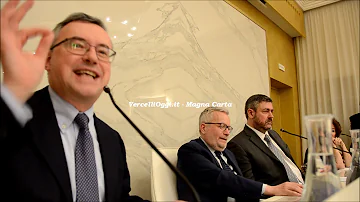Cosa dice la Magna Carta?
Sommario
- Cosa dice la Magna Carta?
- Come viene vista oggi la Magna Carta?
- Qual'è la differenza fondamentale di applicazione tra la Magna Charta e le moderne Costituzioni?
- What does Magna Carta stand for?
- What were the key ideas of the Magna Carta?
- What was the Magna Carta used for?
- What is a summary of the Magna Carta?

Cosa dice la Magna Carta?
La Magna Charta riconosce per iscritto i diritti dei feudatari, della Chiesa, delle città inglesi e degli «uomini liberi» (escludendo dunque i servi della gleba) nei confronti del sovrano d'Inghilterra, limitandone i poteri.
Come viene vista oggi la Magna Carta?
Certamente, se considerate dal punto di vista moderno, le concessioni fatte dalla Carta fanno tutt'oggi apparire questo documento come un evento di portata eccezionale: è, infatti, il primo esempio di una costituzione octroyée o ottriata (concessa dall'alto di un potere regio).
Qual'è la differenza fondamentale di applicazione tra la Magna Charta e le moderne Costituzioni?
La Magna Charta libertatum e le Costituzioni melfitane sono state promulgate entrambe nel tredicesimo secolo e il fulcro delle differenze tra le due è proprio come, seppur nella stessa epoca, sancisser delle concezioni del potere regio l'una opposta all'altra.
What does Magna Carta stand for?
- Magna Carta is a world-class brand. It stands for human rights and democracy. It stands for trial by jury. It stands for free speech, the rule of law and personal liberty.
What were the key ideas of the Magna Carta?
- The Magna Carta established the idea that everyone is subject to the law, even kings. It was a direct response by English medieval King John () to a political crisis. The document underpins Britain's (unwritten) constitution.
What was the Magna Carta used for?
- The Magna Carta was an attempt by the nobility to limit the power of the king. The Magna Carta was written as a way for the people to protect their rights and liberties.
What is a summary of the Magna Carta?
- The summary of the Magna Carta is as follows: The Church - The Church was to be free from royal interference, especially in the election of bishops Taxes - No taxes except the regular feudal dues were to be levied, except by the consent of the Great Council, or Parliament The right to due process which led to Trial by Jury















